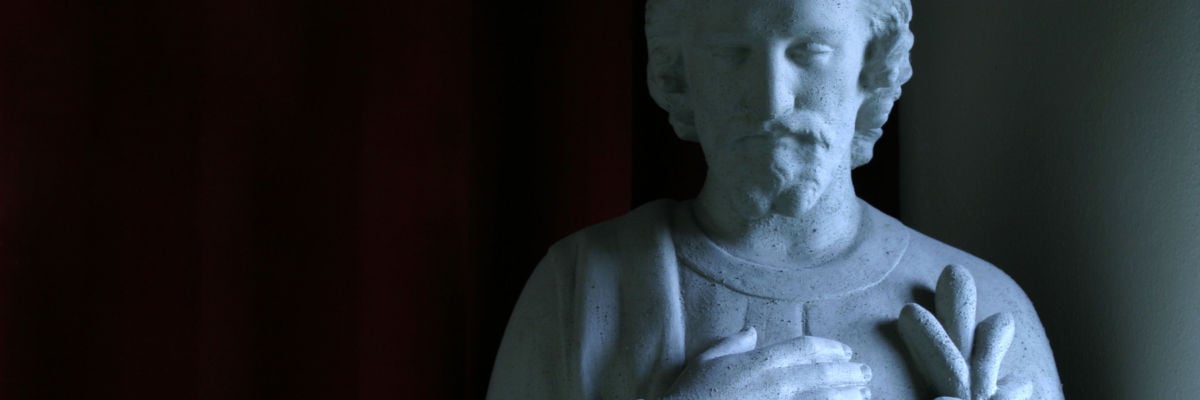
As an infant, I had a rare disease, which (left untreated) has a mortality rate of upwards of 80 percent. Thanks be to God, my mother’s persistence meant that doctors realized what was going on just in time, and my life was spared. It was on St. Joseph’s day, 1985, that I was released from the hospital.
Since then, Joseph has been in my life in a variety of ways. When I was a lawyer, I could turn to St. Joseph the Worker. When I was in seminary, I was inspired by the way he modeled chaste, celibate love for the sake of Jesus and Mary. And now, as a husband and father, I’m inspired by the way he shows what married love and fatherhood ought to look like.
I can envision a possible objection here: how can St. Joseph be a model for fathers when he’s not even Jesus’ real father? Perhaps you’re remembering when Mary and Joseph find Jesus in the Temple, and Mary says to him, “Son, why have you treated us so? Behold, your father and I have been looking for you anxiously.” If so, you surely remember Jesus’ reply: “How is it that you sought me? Did you not know that I must be in my Father’s house?” (Luke 2:48-49). Some Protestant commentaries see in Jesus’ response here a total denial of Joseph’s fatherhood, arguing that this passage shows that “his Father was God, not Joseph,” and that “while people may have assumed Jesus was Joseph’s son, in reality, he had no human father.”
That’s a serious misreading of the passage. One clue is that St. Luke, who has just told us about the Virgin Birth in the prior chapter, nevertheless refers to Joseph and Mary as Jesus’ “parents” three times (Luke 2:27,41,43) in this chapter. But the error is deeper than just a misunderstanding of the Holy Family. If adopted fathers aren’t true fathers, and adopted sons aren’t true sons, then we’re all in trouble. After all, we’ve been adopted as sons and daughters of God, and are destined to receive heaven and earth as our inheritance. As. St. Paul says (Gal. 4:4-7),
but when the time had fully come, God sent forth his Son, born of woman, born under the law, to redeem those who were under the law, so that we might receive adoption as sons. And because you are sons, God has sent the Spirit of his Son into our hearts, crying, “Abba! Father!” So through God you are no longer a slave but a son, and if a son then an heir.
So, in a very important sense, we need to start by saying that yes, Joseph is Jesus’ father. It’s through Joseph’s lineage (see Luke 1:27) that the Evangelists show us that Jesus fulfills the prophecies about the Messiah being a son of David. And it’s important that the finding in the Temple episode ends with Luke telling us that Jesus “went down with them and came to Nazareth, and was obedient to them” (2:51). Jesus perfectly observed the Fourth Commandment—“honor your father and your mother” (Exod. 20:12)—toward Joseph and Mary.
Nevertheless, it’s true that St. Joseph isn’t Jesus’ father in every sense. Most strikingly, he’s not Jesus’ biological father. But more significantly, Jesus’ obedience to his heavenly Father is superior to any earthly obedience, a fact he highlights in his response to his mother. So Joseph is a father, but he is also a sort of “stand-in” for Jesus’ truest father, God the Father. Pope Francis captures this dynamic well in his apostolic letter Patris Corde. Drawing upon the Polish writer Jan Dobraczyński, he describes Joseph as “the earthly shadow of the heavenly Father.”
Is that really unlike the rest of us fathers? St. Paul tells the Ephesians that “I bow my knees before the Father (Patēr), from whom every family (patria) in heaven and on earth is named” (Eph. 3:14-15). The Catechism points to this passage in reminding us that God the Father “transcends human fatherhood and motherhood, although he is their origin and standard: no one is father as God is Father” (239). Later, we’ll be reminded that “parents must regard their children as children of God and respect them as human persons” (2222).
That is, it’s not just Jesus who owed a higher authority to God than to his earthly father. That’s true for my children (and all children) as well. Given the unique circumstances of who his son was and how he came into this world, Joseph was keenly aware of this fact. But it’s worth remembering for the rest of us as well. In the secular world, children are sometimes treated as mere consumer goods to be acquired . . . or manufactured in a lab, if need be. It’s easy for kids to be treated as little more than extensions of their parents’ personalities, or as letterboards upon which mom and dad can make personal statements to the world.
In the Christian world, we sometimes deny the full humanity of our children by an exaggerated vision of “male headship.” The Evangelical pastor Steven Tracy tells the horrifying story of a man caught physically and sexually abusing his own children. The man explained, “I guess I did it because I was the head of the family, and it was my right to do whatever I wanted to my wife and kids.”
But the truth is, our kids aren’t simply automatons created to do our bidding or to complete us in any sense. Instead, they are first and foremost God’s children, and we’re just taking care of them. Like it or not, they have a calling in this life that we didn’t choose for them: their true Father did. And that means we need to know when to back off and let them be about their Father’s business.



